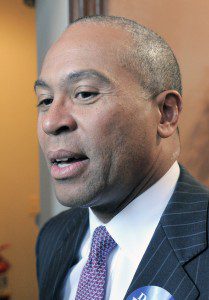PHILIP MARCELO, Associated Press
BOSTON (AP) — A nearly year-long effort by New England’s governors to collectively address the region’s high energy costs is on hold now that some have voiced concerns about the initiative’s dual strategy of importing Canadian hydropower and investing in new natural gas pipelines.
Energy officials from the six states have been developing a proposal that would impose federal tariffs on electric ratepayers to finance the energy infrastructure projects. But the group — the New England States Committee on Electricity — has decided to hold off on the process for at least a month.
The governors had planned to present their tariff scheme, which would ultimately need approval from federal regulators, to a regional association of power companies and users by early September.
Massachusetts Gov. Deval Patrick is seeking a delay while his administration analyzes different energy scenarios, including those that would not require the construction of extensive natural gas pipelines.
“We clearly do want to continue working with our fellow New England states on a regional solution,” Krista Selmi, spokeswoman for Patrick’s office of Energy and Environmental Affairs, said this week. “But we really do need to look at what our needs are at this point.”
Massachusetts is a seen as a key piece of the regional plan since it accounts for nearly half of New England’s total electricity consumption.
Maine Gov. Paul LePage’s administration says it’s “deeply concerned” by the development, which comes as other governors have expressed reservations. LePage, in a letter sent to other New England governors last week, called on Patrick to reconsider his stance.
“We all recognized the problem and we moved forward together,” Patrick Woodcock, director of the Maine governor’s energy office, said this week. “We can’t back away. We need to address regional energy challenges with regional energy infrastructure.”
This winter, state officials say, New England can expect to see a continuation of 2013’s dramatic rise in energy costs, when the total value of the region’s wholesale electric energy market reached about $8 billion, compared to just $5.2 billion in 2012.
Patrick and the other governors say they’re still committed to a regional solution.
But Rhode Island says in the meantime it’s looking into other ways to address its energy challenges, either individually or with a small group of states.
“The problems are serious enough that we have to explore all options,” says Nicholas Ucci, chief of staff for Gov. Lincoln Chafee’s Office of Energy Resources. “The best and most cost effective way to achieve our goals is to work together as a region, and we’ll do that, to the greatest extent possible. But, in the same vein, as some doors close, new doors open.”
Connecticut Governor Dannel Malloy said through a spokesman he believes the expansion of regional natural gas pipelines and transmission line infrastructure is still the “best way” forward.
“The problem our region faces is greater than one state can solve alone,” said Andrew Doba, Malloy’s communications director.
A spokesman for New Hampshire Gov. Maggie Hassan said her administration will only back proposals that reduce costs to ratepayers and “respect state siting requirements and protect natural resources.” Hassan opposes the “Northern Pass” transmission line project that would send Canadian hydropower through the Granite State.
Vermont Gov. Peter Shumlin, meanwhile, wants to make sure the region does not make unnecessary energy infrastructure investments and “builds only what it needs, where it needs it,” said Susan Allen, Shumlin’s Deputy Chief of Staff.


